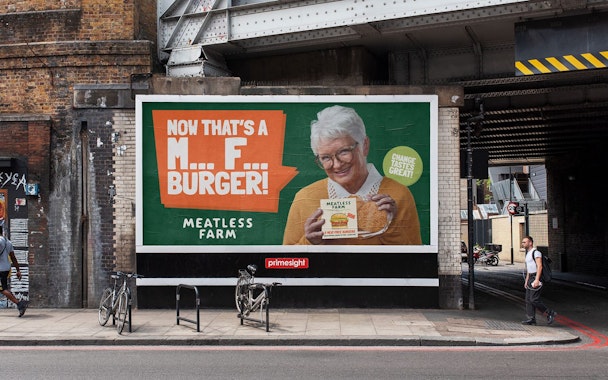The ever-growing boldness of fake meat advertising
Lab-created meat alternatives by the likes of Beyond Meat, PLT and Impossible Foods are gaining popularity and market share, even taking their place on fast food menus at Burger King and McDonald's. Tree Elven, author and founder of ADDS at Addvertising.org, explores the meat-alternative dichotomy and how advertising helped build these brands.

Quorn has been around since 1985, producing a meat substitute made from a fungus in its bid to reduce reliance on animal protein to feed the world. Fast-forward to 2020, and Britain's Leeds-based Meatless Farm is stirring the pot with its attention-grabbing ’Now, that’s a M.... F.... Burger!’ campaign. We’ve come a long way.
“We wanted to communicate to meat-eaters that there is no compromise on taste, texture or price when going M*** F***. Simply swapping once a week can make an astonishing impact on our environment and people's well-being,” preached Michael Hunter, chief growth officer at Meatless Farm.
The brand also challenged the public to become BBQ warriors and use its plant-based products instead of traditional animal meat. By positioning barbie fans as activists, and using effective visual references in the video campaign, Meatless Farm hit home that over-consumption of meat is devastating the environment.
This report by international NGO Global Witness chronicles the killings of environmental defenders. Meanwhile, deforestation and harmful livestock-farming techniques have been developed to feed huge demand for burgers and other meat products that would previously have been luxuries rather than everyday eating.
But the meat-free fightback‘s attracting rap and rock icons, embodying its growing popularity.
Snoop Dogg surprised customers at a Dunkin‘ drive-through in Los Angeles by serving up meat-free Beyond Meat sausage sandwiches in this 30-second ad. Dunkin’ says that it brought in the ‘biggest Beyond Meat fan‘ it knows and dubbed him Employee of the Month for his efforts.
Meantime, Italian-American restaurant chain Frankie & Benny’s deployed US rock icon Meat Loaf earlier to promote its vegan option with a play on famous lyrics: fans will know Meat Loaf ‘won't do that‘, but the question has always been, what is ‘that‘? (Watch the clip to find out).
Now celebrities including Jay-Z, Beyoncé, Serena Williams, Zedd, Trevor Noah and Will.i.am have put their money where our mouths are bringing massive endorsement to a global industry which looks set to treble between 2018 and 2026, from $10bn to more than $30bn. No wonder the likes of Bill Gates and Al Gore are involved.
So, whether you’re a carnivore wanting to cut back, a vegetarian or vegan looking for fresh flavours to tickle the taste buds, or simply a curious foodie, meat alternative products are looking good, right?
Not quite
Now the debate arises as to their health value – after all, they are highly processed foods, and many hold that the closer we can eat to ‘whole‘ unprocessed foods, the healthier we will be. Meat-free is not the same as fake meat. Will there be a ‘Guinness isn‘t good for you‘ moment for this industry where the health facade falls?
Critics argue that although the meat-alternative products are sold under the banner of ‘plant-based’ (often pea or soy), they are essentially laboratory creations whose ingredients are manipulated to an extent that makes them highly questionable in the health and environmental stakes. In the US, the backlash has begun, with ads such as this one from the Consumer Freedom’s Clean Food Facts. It called out the presence of a carcinogen called acrylamide in certain artificial meat products, in quantities large enough to require a warning label under Californian law. Consumer Freedom also points to other ingredients it says may be present in some products, in fairly scary terms.
In this article for the Food Revolution movement, ‘Impossible Food, Impossible Claims’, sustainability author Anna Lappé addressed the issue of mega monoculture and genetically engineered crops, such as the soy used in Impossible burgers.
Environmentally, the fake meat companies have cleaned up their packaging.
They are no longer wrapping the treats in single-use plastic, as Quorn did in the early days. Detractors point out that the mass production and intensive farming of the base ingredients still goes against the regenerative farming methods needed to help heal the planet and achieve sustainability alongside improved global health outcomes.
Producing just 5% of the world’s food calories creates 40% of the environmental burden, says this report co-authored by the University of Oxford’s Joseph Poore. He‘s talking about meat. Poore’s research actually informed Meatless Farm’s launch of its Meatless Consumption Target, a campaign aimed at encouraging UK households to eat one more plant-based meal per week by 2021.
“Remarkably, if every household in the UK swapped just one more meat-based meal per week to plant-based, it would result in an 8.4% reduction in the UK‘s greenhouse gas emissions – the equivalent of taking 16 million cars off the road,'' said Hunter.
And finally, though the new age of meat alternatives may look tempting, a widespread feeling among health and fitness experts appears to be that, given the pros and cons, it’s best to use fake meat options very sparingly in your diet.
A bit like what grandma used to say about meat itself, in fact…
If you’ve found this interesting, keep an eye on Addvertising.org – updated daily – and/or join ADDS Club for more contextualisation of today’s ads.
